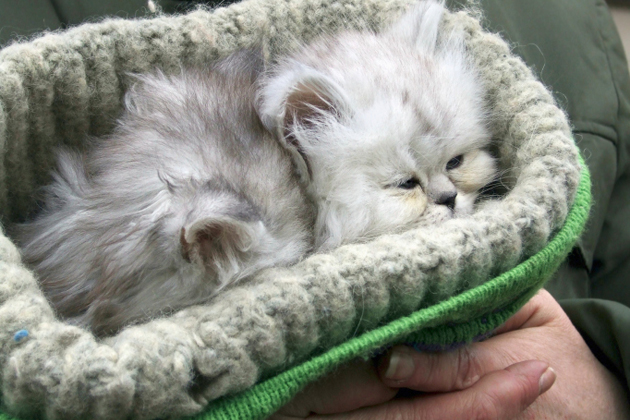1. Verify Your Kitten's Age

Your kitten's age is more than just a number — in fact, it's a crucial part of her health care. For the first eight weeks of their lives, kittens have very specific developmental needs. Many breeders and shelters prefer that kittens not be released until they are at least 10 to 12 weeks. If you find yourself with a kitten under 8 weeks old, you'll need to consult your vet for special instructions.
2. Find a Good Vet

If you don't already have a veterinarian, ask friends or your cat's breeder or shelter for a referral. Our Find tool is also an excellent way to find a local veterinarian. Just type in your ZIP code and let Vetstreet help you find a vet near you.
3. Get the Most Out of Your First Vet Visit

At your first visit, the veterinarian will check for common health issues, including birth defects, parasites and feline leukemia. But this first appointment is also a perfect time to ask all your pressing kitten questions. To start, here are some questions you should ask your vet:
- What kind of food should my kitten eat? How much and how often should she eat?
- How do I control parasites like fleas and ticks?
- What are common signs of illness?
- When is it safe to introduce my cat to other animals? How should I do it?
- When should I schedule my next vet appointment?
- When should my kitten be spayed or neutered?
- Should my cat be indoor or outdoor?
4. Shop for Quality Food

Feeding your kitten isn't as simple as grabbing a bag of kibble from the grocery store. Growing kittens need more calories and nutrients than adult cats. The simplest way to ensure she's properly fed is to buy a name-brand food formulated for kittens. Make sure the food is labeled as complete and balanced for the life stage of your cat by the Association of Animal Feed Control Officials (AAFCO).
5. Set Up a Feeding Schedule

To make sure you know exactly how much to feed your kitten, ask your veterinarian what the appropriate portion size is and how often you should feed her. For kittens 3 to 6 months old, most vets recommend three feedings a day. Once she's reached 6 months, you can scale down to two times a day. Also, make sure she has plenty of fresh water, and don't even think about giving your kitten any milk — despite a reputation for loving milk, cats don't have the enzymes to digest it properly, so your kitten could end up with diarrhea.
6. Be Sociable

Once your vet gives you the parasite and disease all-clear and your pet has had her proper vaccinations, it's safe to let your kitten make new animal and human friends and explore her new digs. Plus, if you haven't already, it's time to play with her so you can start forming "the bond." If you have children, though, monitor their interactions closely. The claws might come out if your kitty's tail is pulled.
7. Prepare a Room

Before you bring your kitten home, set up a room that will make her feel comfortable and safe, especially if you have other pets who will be curious about their new feline sibling, or children who need monitoring when interacting with the kitten. Put her litterbox, food and water dishes and comfortable bedding in her special space.
8. Gear Up

Dreamstime
While cats range from being very low-key to very needy, they all need certain things to keep them happy.
Here are 10 kitten must-haves:
- Quality food, specifically formulated for kittens
- Collar, ID tags and microchip
- Food bowls, preferably metal or ceramic
- Litterbox and cat litter
- A comfortable, warm cat bed
- Cat carrier
- Scratching post
- Kitten-safe toys, no small pieces that your kitten can swallow
- Cat brush
- Cat toothbrush and toothpaste (get her started at a young age)
9. Watch for Early Signs of Illness

Unfortunately, young kittens are susceptible to a host of diseases. If you notice your kitten has no appetite, doesn't gain weight, is vomiting or has diarrhea, or is lethargic and sneezing, contact your veterinarian immediately.

.jpg)
.jpg)
.jpg)

No comments:
Post a Comment
Thanks For Your Comments